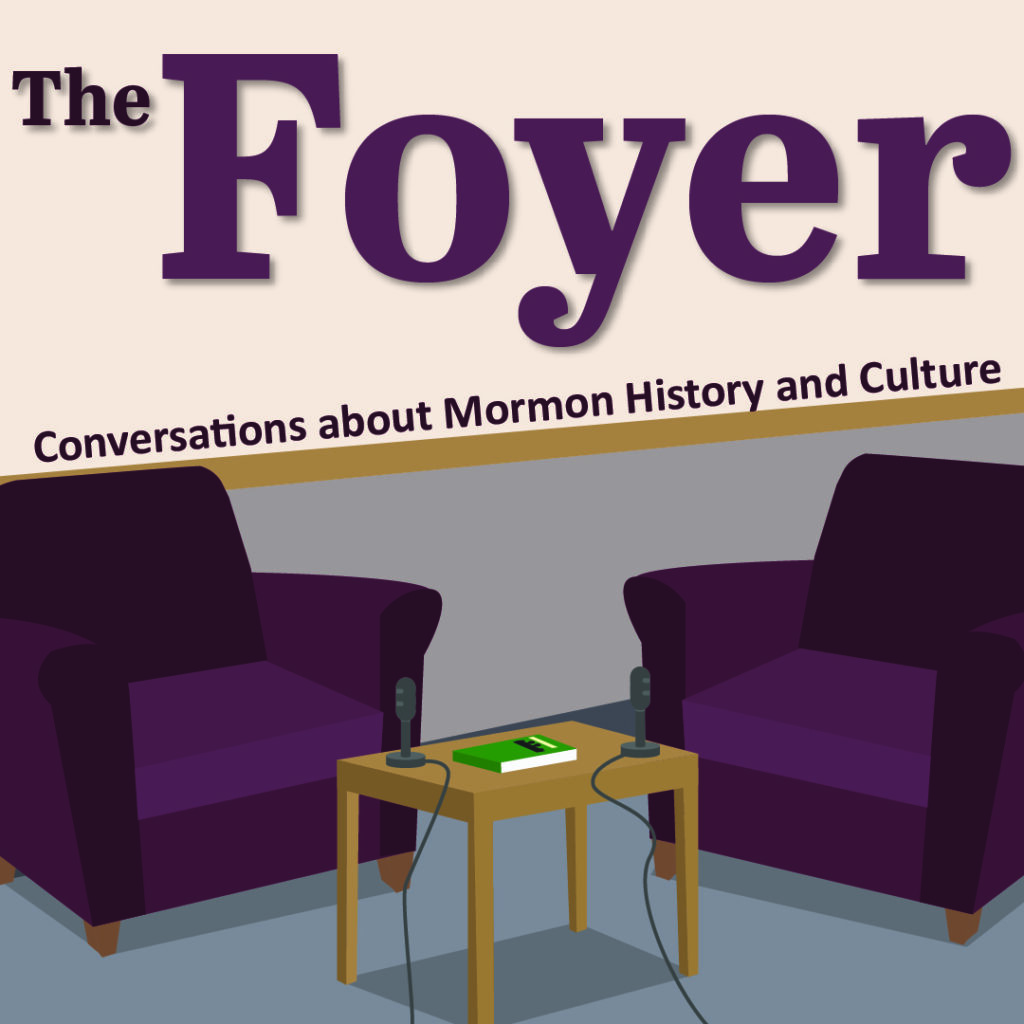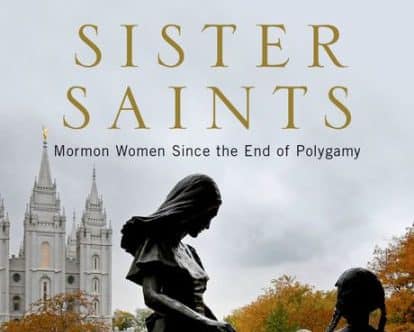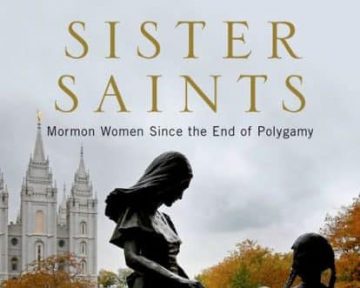A few years ago, I began studying Mormon history in earnest. I realized that my time as a history research assistant about the Mormon Trail in 2009 was not just a summer job before I started my master’s program, but something that rooted questions in me that were growing and expanding as time went on. In early 2019, I felt like I had read some great work on Mormon women in the early Utah period, and that I had some grasp on Mormon women’s writings and history in recent decades, but that I had a major gap in my understanding of the end of the 19th century and much of the 20th century.


Enter Sister Saints: Mormon Women Since the End of Polygamy by Dr. Colleen McDannell, professor of history and Sterling M. McMurrin Professor of Religious Studies at the University of Utah (read Dani’s review here). It is a relatively short book (202 pages before end matter), but McDannell skillfully packs in so much content and context. I knew that the Relief Society had run hospitals and major social programs, but what happened to that progressive organization? What happening in the post-WWII Church when women’s roles in leadership protracted and rhetoric around women became so focused on the home and motherhood? When did the Relief Society lose authority and autonomy over budgets and lesson plans? How did the women act and react during all of these changes? Sister Saints discusses these issues and so much more.
And while Sister Saints covers fascinating history, reading this book was not just an intellectual exercise for me. It was impossible for me to not respond emotionally. To borrow a phrase from Brené Brown, this book has wings—there were many times that I wanted to throw it across the room. It is hard for me to read the decades-long process of male Church leaders rolling back the women’s autonomy in finances, https://exponentii.org/wp-content/uploads/2021/12/IMG_5173-scaled-1.jpgial control of publications, exercising of spiritual gifts, and more. The story is not perfectly linear—there are some ways that women have more presence and authority now than previous generations, and, McDannell argues, ways that the Proclamation on the Family leaves gender roles unfixed and adaptable—but so much felt like one tragedy after another.

I was immediately interested when I saw that McDannell was going to be a guest on the podcast The Foyer: Conversations about Mormon History and Culture hosted by Dr. Patrick Mason and sponsored by Utah State University’s Religious Studies Program. McDannell and Mason are long-time friends and it was a fascinating discussion of both McDannell’s larger career as a historian of American religion and her book Sister Saints in particular. The entire podcast episode, available on The Foyer’s website and Spotify, is worth a listen, but there was one moment that I had to stop and re-listen to several times.
Mason and McDannell were discussing the challenge of archives and how what is preserved is a major factor in what can be studied and written about. For Catholic lay women, there are relatively few sources in archives, but that isn’t the same problem for Mormon women.
Dr. Mason: “I remember us talking one time at lunch and you reveling in the fact that there were all these [Mormon] women’s diaries and other things to read that you just haven’t encountered in the study of Roman Catholicism.”
Dr. McDannell: “Yeah, it’s interesting because people have said, ‘Oh, Mormon women have been silenced, you know their voices are silenced, they haven’t been allowed to speak.’ But that’s absolutely not true. They have spoken a whole lot. There’s so much stuff. There’s a lot of stuff. It’s just nobody listens. They speak, but nobody listens. So there’s a lot of primary source material. There’s a ton of primary source material, but there’s almost no analysis. There’s no interpretation. There’s very little history. Even you know, the Relief Society Magazine which has got short stories, and articles, and all sorts of creative ways that women are speaking, no one has written about it. No one has tried to understand what all these women are saying in these short stories that they’re publishing, or reams of poetry that they’re publishing. How are they creating theology, how are they creating Mormon history—a Mormon experience—through their work? And that’s what needs to be analyzed.”
Mic drop.
Mormon women are speaking and have been speaking for nearly two centuries. They make and keep records, and they publish their words. But no one listens. Or at least not enough people. Not enough men in leadership at any level listen to women. Not enough lay members seek out the words of women. Not enough people support, financially or otherwise, Mormon women speaking and publishing. While I will say that within the last decade, there has been an incredible blooming of both scholarly and popular writing by and about Mormon women, there is so much work to be done.
Ultimately, Sister Saints feels like a gift to anyone interested in Mormon women or Mormon history and is a source that I keep going back to. I don’t know of any other book that covers this time frame with this lens and does such a brilliant job of tracing themes and also pointing the way for further research. McDannell’s bibliographical essay at the end of the book is a gem for anyone wanting to dive deeper into any of the issues she raises. I look forward to reading more of her work, including Material Christianity: Religion and Popular Culture in America and The Spirit of Vatican II: A History of Catholic Reform in America.






8 Responses
Thanks for this reminder, Katie! I have a copy and need to read it.
Thanks for the review – I will check this book out! Although I admit it is depressing to see how the more things change the more they stay the same (for Mormon women). I think she totally nailed it – women are talking, but no one is listening.
“They speak, but nobody listens.” I feel this.
We don’t even listen to official church sources of women’s stories. When’s the last time you’ve had a lesson taught from Daughters in My Kingdom or At The Pulpit?
I’m excited to listen to that podcast episode. Sister Saints was a great book. When I read some parts, the mormon feminist in me sometimes wanted to yell “Aaaah! Why aren’t you saying how awful that was!?!” But then a few paragraphs or pages later, she would explain how this situation made some women feel X, while others viewed it as Y. I came to appreciate how she presented historical situations neutrally and then explained how people reacted.
I requested a copy and the library system has it. Looking forward to reading it!
I just put it on my birthday wish list. Thanks for the recommendation! My library’s offerings on Mormons are mostly Warren Jeffs based
As Katie points out Mormon women have been speaking and writing for decades, and that has been the case during my lifetime (see Exponent II, Mormon Women’s Forum, etc.). Dr. McDannell certainly goes straight to the heart of the matter: no one — or, rather, not enough people listened back in the 1960s and 70s and 80s and 90s and 00s and 10s… and top leaders in particular seem to be listening less and less, rather than more, content to toss a few cosmetic changes while continuing to pour cement into a system that keeps women from being full participants. Some of us got tired of banging our heads against the wall, of being punished in large ways and small for speaking up, of spending time and effort writing and otherwise pointing out the lack of logic / scriptural bases for such disparate treatment. Much as I applaud seeing another book about Mormon women get published, and even after quite a few years of “rest,” I’m not sure if I have enough energy even now to want to be reminded of all the waste.
(My editor’s heart deplores the lack of a comma after the very first clause. 🙂